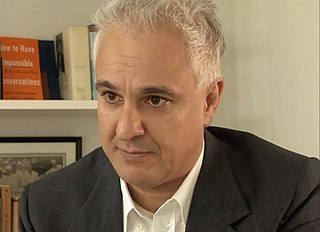A Quote by E. Haldeman-Julius
The influences that have lifted the race to a higher moral level are education, freedom, leisure, the humanizing tendency of a better-supplied and more interesting life. In a word, science and liberalism . . . have accomplished the very things for which religion claims the credit.
Related Quotes
Science has only two things to contribute to religion: an analysis of the evolutionary, cultural, and psychological basis for believing things that aren't true, and a scientific disproof of some of faith's claims (e.g., Adam and Eve, the Great Flood). Religion has nothing to contribute to science, and science is best off staying as far away from faith as possible. The "constructive dialogue" between science and faith is, in reality, a destructive monologue, with science making all the good points, tearing down religion in the process.
I think that growing up in a crowded continent like Europe with an awful lot of competing claims, ideas, cultures, and systems of thought we have, perforce, developed a more sophisticated notion of what the word freedom means than I see much evidence of in America. To be frank, it sometimes seems that the American idea of freedom has more to do with my freedom to do what I want than your freedom to do what you want. I think that in Europe we're probably better at understanding how to balance those competing claims, though not a lot.
If we once admit that our life is here for the purpose of race-improvement, then we question any religion which does not improve the race, or the main force of which evaporates, as it were, directing our best efforts toward the sky.... Improvement in the human race is not accomplished by extracting any number of souls and placing them in heaven, or elsewhere. It must be established on earth, either through achievement in social service, or through better children.
The only thing that really matters now is whether man can climb up to a higher moral level, to a higher plane of consciousness, in order to be equal to the superhuman powers which the fallen angels have played into his hands. But he can make no progress until he becomes very much better acquainted with his own nature.
The 21st century looks different. It's been very disruptive. It has created a lot of insecurity. We have to adjust to that, because the 21st century has real promise. Now, the higher-paying jobs of this new century are fantastic. The problem is, you have to have some level of higher education, maybe not a four-year degree, but some level of higher education, to get those jobs.
Liberalism is a creation of the seventeenth century, fathered by British philosopher John Locke (1632-1704). For Locke, liberalism means limited government, the rule of law, due process, liberty, freedom of religion, freedom of speech, freedom of the press, freedom of assembly, separation of church and state, and separation of government powers into branches that oversee each other's authority.
We greatly want a brief word to express the science of improving stock, which is by no means confined to questions of judicious mating, but which, especially in the case of man, takes cognizance of all influences that tend in however remote a degree to give to the more suitable races or strains of blood a better chance of prevailing speedily over the less suitable than they otherwise would have had. The word eugenics would sufficiently express the idea.
Science is like society and trade, in resting at bottom upon a basis of faith. There are some things here, too, that we can not prove, otherwise there would be nothing we can prove. Science is busy with the hither-end of things, not the thither-end. It is a mistake to contrast religion and science in this respect, and to think of religion as taking everything for granted, and science as doing only clean work, and having all the loose ends gathered up and tucked in. We never reach the roots of things in science more than in religion.
Trouble arises when either science or religion claims universal jurisdiction, when either religious dogma or scientific dogma claims to be infallible. Religious creationists and scientific materialists are equally dogmatic and insensitive. By their arrogance they bring both science and religion into disrepute.






































